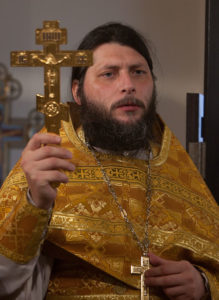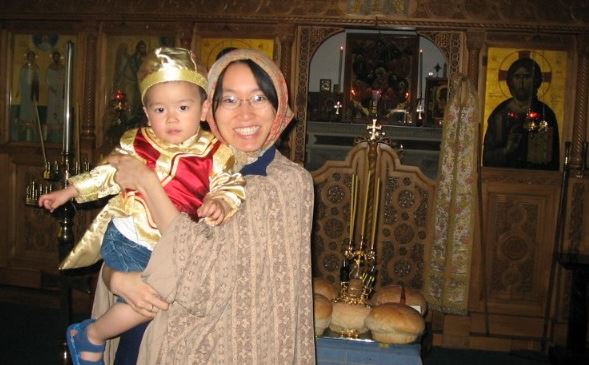 An interview with Father Dionisy Pozdynaev by Tudor Petcu
An interview with Father Dionisy Pozdynaev by Tudor Petcu
1.) What should we know about the orthodox mission in China? Could we talk about a real missionary work of Russian Orthodoxy in China?
I cannot speak about real missionary work yet; we are still preparing for missionary work. We must lay the groundwork and preparet the missionaries, and we have just begun. Some years ago, I moved to Hong Kong from Moscow to be closer to mainland China. It’s much easier to visit from Hong Kong because of visa regulations, expense, and distance, and, of course, Hong Kong is already the Chinese world.
When I arrived, I served for a year in Metropolitan Nikitas’ church, who oversees the Asian missions of the Ecumenical Patriarchate. We have good relations and this is important, as it is always a shame when interjurisdictional problems influence missionary work. I would like to see good relations among all Orthodox – Constantinople, Tokyo, Moscow, China, and throughout Asia. In my opinion the only way to do missionary work in China is for all Orthodox to recognize the previously established autonomous Chinese Orthodox Church, and work together towards full recognition by the Chinese government.
2.) What could you say about your Orthodox comunity in Hong Kong?
There was a long-standing Moscow Patriarchal parish in Hong Kong, but the priest died in 1971 and no one was sent to take his place. So, this is a reopened parish of the Moscow Patriarchate, which has a long tradition here. Part of the old Anglican cemetery was set aside long ago and consecrated for Orthodox believers and Orthodox priests. We now have a house church in the center of Hong Kong, dedicated to Sts. Peter and Paul. Our parishioners rent an apartment and the church is open not only to Russians, but to all foreigners, as well as to the Hong Kong Chinese.
3.) Do you think that Orthodoxy could become stronger in the chinese society in the future?
We hope so, but another factor is that Orthodox Christianity is now recognized only as the religion of the Russian ethnic minority in northern China. I believe it is very important to change the attitude of the Chinese authorities, that they recognize Orthodoxy not only as the religion of Russians, so that it can be open to all nationalities. Certainly, their current recognition of Orthodoxy as the religion of an ethnic minority within China is a chance for us now, but in the future this approach should change. We need to create a real Chinese Orthodox Church, with Chinese language and ways of expression in iconography and church music.
The Chinese themselves will create this expression. I also believe that missionary work in China should be done by native Chinese. As foreigners, we can only help them. We can orient them, educate them about Orthodoxy and prepare them to teach. Of course, the best variant would be to open a theological school in mainland China, but political restrictions make this impossible now, so the only possibility to give students experience of church life and a basic knowledge of Orthodox theology is to invite them to our own seminaries and church schools.

4.) I would also like to know if in the meantime the idea of “Chinese Orthodox liturgy” has become reality.
After 1905, most of the services of the Russian Ecclesiastical Mission were in Chinese. Churches that had large Russian populations, like in Harbin, celebrated in Slavonic, but the Ecclesiastical Mission in Beijing did the liturgy, vespers, and matins in Chinese. After we restore these old texts and make some corrections, they may be republished, but corrections are certainly needed because the Chinese language changes rapidly, much more quickly than western European languages. What worked at the beginning of the century doesn’t work now. Of course, educated people can read and understand the older language, but not country people or those in remote regions. Since 65 percent of the Chinese population lives outside the cities and large towns, we have to take them into account in any translation.
5.) Why a Chinese would like to become orthodox from your point of view, considering that you have a strong relation with different Chinese converts to Orthodoxy?
The main attraction is the feeling of truth. This feeling should be the main reason for belief. Being attracted by traditionalism or non-traditionalism is important, but it is not the chief thing. The impression of Orthodox services will be very important to the Chinese, because they can understand liturgy through experiencing it, not through the mind, or philosophy. They can look at it and feel something. We have to involve the mind in this process, of course, but tradition by itself is not enough.
Buddhism is also very traditional and even older, as is Judaism, but their traditionalism isn’t enough of a reason to choose them. If we can present the cycle of services: vespers, matins, hours, and liturgy in the Chinese language, in a traditional Orthodox style of reverent usage, it will be very attractive. As I said, our first translating task is to create lexical norms in Chinese for both the church services and other reading, so that the translations will be uniform and of high quality. Perhaps the Chinese government will finally allow Orthodoxy because of the close historical links between China and Russia. And this is not bad. In Russia, Orthodoxy was also chosen under the influence of political reasons.
It was the personal choice of St. Vladimir because of his personal experience of Orthodoxy’s spirituality, but his ambassadors to different countries advised him to choose Orthodoxy because of quite simple impressions, not because of any philosophy. The emphasis in Russian Orthodoxy is often on attention to form, to details. Sometimes this is very good, but sometimes it can create a lot of difficulties, as we see in the Old Believer’s Schism. But there is already a beginning – the government has helped build three new Orthodox churches in mainland China.
![]()

Leave a Reply